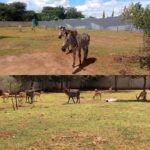Sat, 08 Jul 2017 13:08:58 +0000
By SIMON MUNTEMBA
IT was a solemn moment characterized with candle –lighting and a minute of silence in remembrance of the 800,000 people who were slaughtered in the Rwanda genocide.
In 1994, in a space of three months, about 800,000 Tutsis and moderate Hutus were killed in Rwanda in what came to be known as ‘Rwanda genocide’.
The United Nations (UN) declared April 7 as the day to remember the victims of Rwanda genocide annually.
And Rwanda High Commission in Zambia remembered the 1994 genocide victims by celebrating its 23rd Rwandan Liberation day yesterday. High Commissioner of Rwanda to Zambia, Monique Mukaruliza said over 300 guests that included the Rwandan community living in Zambia, Zambian government officials and civil society organisations attended the function. She said a celebration day was important as it spoke volumes on how much Rwanda had prioritized unity and reconciliation, since the 1994 genocide against the Tutsi.
Ms. Mukaruliza said the day which was nationally celebrated on July 4, annually, was celebrated on July 7, 2017 under the theme, ‘together we prosper’. She explained that Liberation day was a day when tributes were made in recognition of the courage and sacrifices made by the selfless men and women who contributed in the stopping of genocide against the Tutsi. “Rwandans also celebrated Rwanda’s rejuvenation as a country on all fronts attained in the last twenty-three years under the very able stewardship of President Paul Kagame,” Ms Mukaruliza.
The High Commissioner said, historically, Rwanda’s turmoil that culminated in the 1994 Genocide against the Tutsi and left the country on the brick of a failed state had roots in the divisive leadership that pre-dated the genocide.
Ms Mukaruliza stated that as a result of the pre-1994 deplorable leadership in tandem with earlier colonial era divide and rule policy, a section of Rwandan population in their hundreds of thousands were forced into exile.
“It is with this backdrop of carnage and bad leadership that imperative liberation struggle was waged by the Rwanda Patriotic Front (RPF) from October 1990 until the successful end of the genocide against Tutsi in 1994,” she said.
She further said that Twenty-three years after the 1994 genocide, Rwanda’s liberation struggle had evolved into continuous efforts of ensuring human freedoms and economic emancipation.
And Ms Mukaruliza asserted her commission’s gratitude for the bilateral relationship that existed between Zambia and Rwanda which she said was growing from strength to strength.
“Indeed, the invitation by President Edgar Chagwa Lungu and President Paul Kagame’s subsequently state visit to Zambia on 19th to 20th speaks volumes on the trajectory of the relationship,” she said.
She said Zambia and Rwanda continued to grow and nourish the existing bilateral relations across many sectors.








